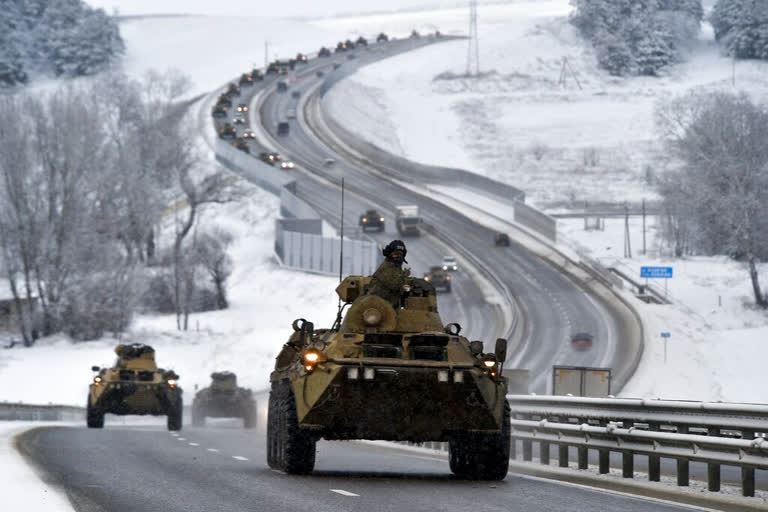New Delhi: War over water and its consequent implications have been a recurring theme in human history. One of the most stirring ones where the fight for water was a dominant underlying theme was the famous battle of Karbala in Saudi Arabia about 1,400 years ago when Hussain, the grandson of Prophet Muhammad, attained martyrdom in his fight against the army of Ummayid Caliph Yazid, thereby paving the way for the overthrow of the Caliph's dynasty.
Another war over water may be presently taking shape about 4,000 km away from Karbala on the borders of Russia and Ukraine. With the Russians amassing about 1,00,000 soldiers and huge military hardware along the border and the US government ordering the evacuation of embassy staff from capital Kyiv on Sunday, there is a certain imminence of an all-out war.
On Monday, UK followed suit with a travel advisory reading: ‘Some embassy staff and dependants are being withdrawn from Kyiv in response to growing threat from Russia.” On Saturday, the US State Department had announced: “We are assisting Ukraine with new lethal defensive security assistance, including ammunition for the front line defenders of Ukraine. The first of several shipments for Ukrainian armed forces totaling $200 million arrived in Kyiv January 22… and more will arrive in the weeks to come.”
But at the root of such a possible war, if it breaks out, is water—immensely strengthening the possibility of the first ever major war over water in the modern era. Ukraine was part of the erstwhile Union of Soviet Socialist Republic (USSR) that fragmented in 1991. Beginning as a ‘neutral’ nation, Ukraine maintained military contact with Russia but also began to get closer to NATO.
In 2014, Russia invaded Ukraine and annexed Crimea, a Russian-dominated 2.5-million-people-strong peninsula in Ukraine that is surrounded by sea on all sides. The annexation resulted in Ukraine blocking Crimea’s access to water by building a dam. Crimea was earlier served by a Soviet-era canal that supplied 85 per cent of its water requirement from rivers on the Ukrainian mainland, mainly from the Dneiper river.
Consequently, since 2014, Russia has been incurring huge expenses amounting to about $20 billion much of it in meeting Crimea’s water requirements both for consumption and meeting farm needs and also for the large Russian naval base. The matters have come further to a head due to a bad drought last year.
Also Read:NATO hardens stance on Russia: Cold War@2.0?
Prof Kumar Sanjay Singh, who teaches Russian history at a Delhi University college, said, “If a war triggers off between Russia and Ukraine, it may be the first water war of the modern era with the potential to trigger of a trans-regional conflict.”
On the importance of Crimea for the Russians, Prof Singh pointed out: “Importance of retaining control over Sevastopol and Crimea can never be overstated from Russian military perspective. Crimea and Sevastopol, where Russian Black sea fleet is stationed, provide a warm water port. Owing to this strategic significance, the Crimean peninsula has loomed large for Russian leaders.”
“To give an idea of how deep-seated the contest over Ukraine is, Peter defeated Charles XII of Sweden's attempt to conquer Ukraine at the 1709 battle of Poltava. Ever since, Russian Tsarina Catherine the Great annexed it from the Ottoman Empire in 1783.”
“Russia has fought several wars to retain control over it—the Crimean war 1856, the German bombings in World War II and finally the annexation of Crimea from Ukraine in 2014.”
“It seems to me that by escalating tension with the west over the eastward expansion of NATO Russia wants to ensure control over the areas that would ensure uninterrupted flow of the Crimean canal,” Prof Singh added.



